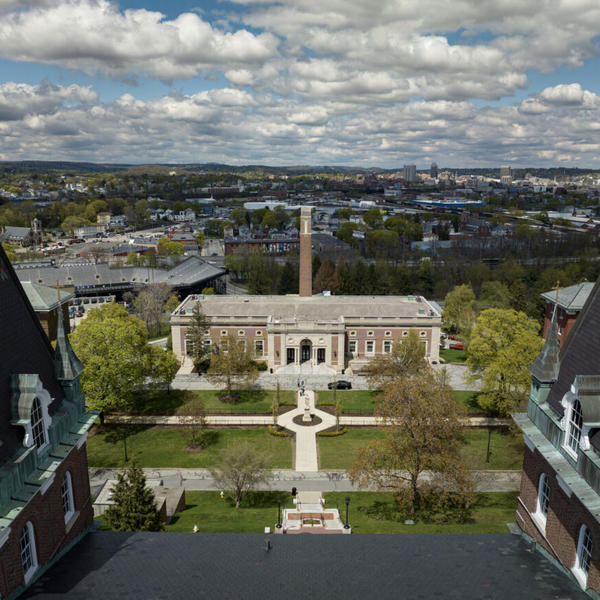College of the Holy Cross Science in Community students are on a mission to change the future makeup of the science, technology, engineering and math (STEM) fields.
Each week of the spring semester, students in the College’s Community-Based Learning (CBL) course taught a different scientific concept to elementary school-age girls who attended an after-school club at Worcester’s Girls, Inc., a nonprofit inspiring girls to be healthy, educated and independent. The Holy Cross students are working to counter messaging that historically has pushed girls away from science.
"This class is a perfect opportunity to put into practice my beliefs around making STEM available for everybody," says Mya Beausoleil ’23, a chemistry major with a concentration in biochemistry. "One-on-one, we can talk the girls through, ‘How can we get this to work?’ or ‘What can we add?’ In those small moments, you see their innovation and creativity."
Beausoleil, who plans to study pharmacy postgrad, says the Science in Community course also provides space to reflect on her experience as "a woman and POC [person of color] in STEM" and to have "open and honest discussions" with classmates while tackling a real-world challenge.
"It's been shown that girls start to move away from science at age 13 — that's when they start labeling science as ‘not creative’ or ‘for boys,’" says L. Gaby Avila-Bront, associate professor of chemistry, who leads the new course. "But the thing is, by the time you reach 13, you are reacting to a message that you heard earlier."
That pre-13 window is where Avila-Bront and her students see an opportunity to correct the "leaky pipeline" of women working in STEM fields.
Over the semester, Holy Cross students and their Girls, Inc. mentees explored principles of physics while constructing towers out of marshmallows and spaghetti, discussed states of matter while creating colored slime, and explored questions of density while making lava lamps — all while emphasizing the endless potential for creativity in science.
"At one point, one of the girls said, ‘Oh, but this isn't really science,’" Avila-Bront recalls, "and one of my students replied, ‘Actually, anytime you answer a question or you think through something, that is science!"
"The difference from our first session at Girls, Inc. to now is unbelievable — the girls are coming in so excited," major Luke Letizia ’25 says. An experienced youth tutor and science camp teacher, Letizia was excited to find a CBL course combining his passion for science with “breaking down the stigma” of how media and society depict the field. "By showing that there’s so many different avenues within science, we’ve been able to have a big breakthrough with the girls," says Letizia, who notes feedback from the Girls, Inc. students has made him a better teacher.
The CBL course grew in part out of a more than $400,000 grant Avila-Bront was awarded in 2021 from the National Science Foundation — the most prestigious NSF award in support of earlier-career faculty.
Throughout the semester, Avila-Bront witnessed her students emerge as leaders: "I've had all of these students in my classes before, and I'm seeing them in a completely new light. I’m really seeing their creativity, and they're thinking deeply about educational issues."


